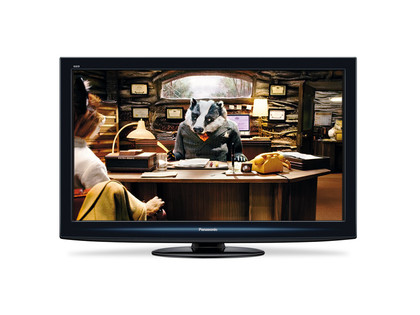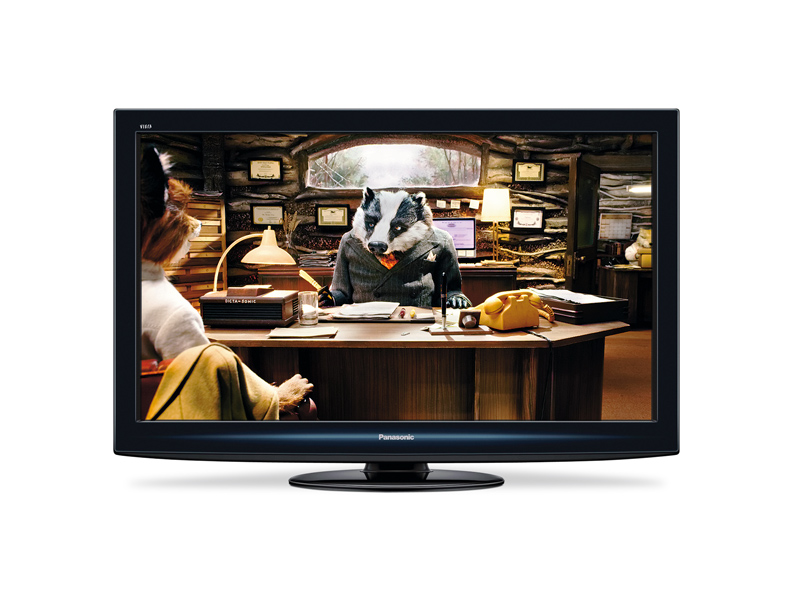Why you can trust TechRadar

Really there doesn't seem to be any part of NeoPDP that hasn't been tinkered with for Panasonic's 42-inch P42G20.
The phosphors used in the plasma cells are apparently revamped; there's a new filter in the screen to boost contrast; there's a different, more efficient discharge gas within each plasma cell; and perhaps most remarkably of all, even the core structure of the plasma cells has been revisited. Blimey. Talk about going back to the drawing board.
Free HD
The other headline feature of the P42G20 is its carriage of not one but two free-to-air HD tuners: Freesat HD and Freeview HD. At first glance we guess this could look a bit gimmicky; why would you need both?
But actually, there are subtle differences in the channel line ups of each service, so the P42G20 is arguably just being a broadcast completist!
Let's not forget, either, that there are still huge swathes of the UK that can't yet receive Freeview HD broadcasts. So the P42G20 is sensibly hedging its HD broadcast bets by making sure its TV will cater for anyone, anywhere.
As with any TV with a Freesat or Freeview HD tuner, the P42G20's extensive suite of connections includes an Ethernet port for accessing future potential interactive services the two platforms might launch (did someone say 'BBC iPlayer'?).
Sign up for breaking news, reviews, opinion, top tech deals, and more.
But that's just the start of the stuff the Ethernet port can do. It's also able to pull in files from a DLNA-certified PC, or take you online to 'surf' Panasonic's ring-fenced VieraCast web service.
This service is one of the most elegantly presented and easy to navigate that we've come across - though we did find ourselves feeling a bit nonplussed about how little its content had changed from last year's models.
Web video
Which is to say the English content comprises just Daily Motion feeds, YouTube, the Picasa web photo album site, Bloomberg, some fairly bog-standard weather information, and Eurosport bulletins. Some sort of internet radio support would have been appreciated, or even a movie-streaming platform like the LoveFilm one now offered on Sony's latest online TVs.
We've actually seen movies streaming into Panasonic's new TVs at various European demos, in fact, so hopefully Panasonic is on the case with securing a film supply deal with one of the growing number of online film providers.
One extra online feature that's definitely coming is Skype. How do we know? Because one of the content boxes on the VieraCast home screen says so. So there you go.
Video playback
The P42G20 offers yet another source of multimedia fun and games courtesy of built-in SD and USB slots. As you might expect of an ambitious TV in 2010, these slots can be used to play JPEG photos, MP3 songs and AVCHD/DivX/MPEG2 video files directly onto the screen.
This is far from the sum total of the USB's talents, though. For in keeping with a growing number of TVs this year, it can be used to add an optional USB dongle that introduces Wi-Fi functionality. Even better, it can actually be used for recording programmes from the digital tuners to an external USB HDD drive.
We've long anticipated the day when TV USB ports would be able to send stuff out as well as take stuff in, and actually Panasonic is just one of a number of brands this year offering such functionality on their TVs.
It's a pity, then, that we found it seriously hard to actually test this handy new feature out, for the simple reason that we struggled to lay our hands on a USB HDD that was compatible with the TV's recording system.
Storage problems
No USB sticks did the trick (it turns out you need a minimum of 160GB for the feature to work). But nor, more surprisingly, did any of the fairly standard - if in some cases rather old - USB HDDs we had lying around the office.
A spot of research on Panasonic's websites revealed that rather startlingly, Panasonic only recommends a single series of USB HDDs as suitable, tried and tested partners for its USB recording system: Buffalo's new JustStore Desktop HD-EU2-UK series.
This apparent exclusivity might, we guess, be just some sort of cross-marketing tool between Panasonic and Buffalo. But if it is, it didn't alter the fact that we were reduced to actually buying one of the drives in question so we could check the P42G20's recordings out. Buffalo must be laughing all the way to the bank. Unlike us.
The good news is that the recordings when they're finally happening are excellent. The drive simply records the HD or standard def digital stream, in fact, so you'll be hard-pushed to detect any difference at all between an original broadcast and a Panasonic USB recording.
Also impressive is the fact that you can set the TV to buffer to USB what you're watching, giving you the option of an instant rewind if you're momentarily distracted for some reason.
Recording limitations
If you're having dreams of recording Top Gear onto USB HDD for later playback on a laptop somewhere, though, then we're afraid it's time to wake up and smell the coffee. For predictably, the TV 'bonds with' the USB HDD drive when you first set it up, so that content you record onto it can only be watched on the same TV.
Moving on to the P42G20's picture features, it's often struck us as a bit odd - and disappointing - that Panasonic doesn't allow people more set-up flexibility on its entry-level and mid-range plasmas.
So it's really nice to find the P42G20 introducing such fine-tuning niceties as adjustment of the cut-off and gain values for the red, green and blue picture components, and various gamma presets. These include an S-Curve setting to emphasise mid-brightness detail, plus the likely most widely used 2.2 default value.
The extra calibration flexibility of the P42G20 is doubtless a big reason why Panasonic has been able to bag - for what we believe is its first time - official endorsement from the independent Imaging Science Foundation (ISF). This means that the ISF feels the TV is flexible enough for one of its engineers to come round and calibrate it for you. Provided you're willing to pay them for the privilege, of course.
If that sounds like too much trouble - though actually, it's something we'd recommend you at least think about - then you might well find yourself headed for the P42G20's other 'celebrity' endorsement: the THX mode tucked away in the picture presets.
Especially since the extra quality of the P42G20 versus last year's equivalent G10 series really seems to have helped the THX calibrators find their stride, delivering a preset that we actually only tinkered with to a very small degree before declaring ourselves satisfied.
Current page: Panasonic TX-P42G20: Features
Prev Page Panasonic TX-P42G20: Overview Next Page Panasonic TX-P42G20: Picture quality
John has been writing about home entertainment technology for more than two decades - an especially impressive feat considering he still claims to only be 35 years old (yeah, right). In that time he’s reviewed hundreds if not thousands of TVs, projectors and speakers, and spent frankly far too long sitting by himself in a dark room.
